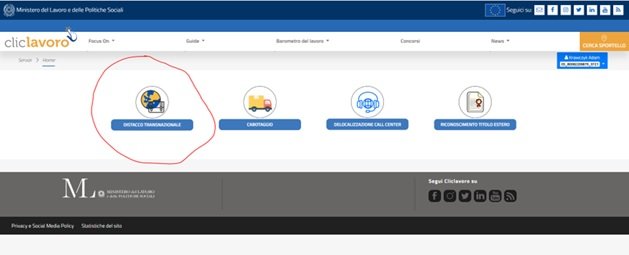The Union legislation imposes an obligation on employers to report the posting of workers to the appropriate authorities of host countries. Therefore, each EU country has taken measures allowing to make such a notification, e.g. the SIPSI portal was created in France, and in Germany – ZOLL. Submitting a declaration is relatively easy in most countries. However, there is an exception to this rule. This is CLICLAVORO, i.e. the notification of the posting of employees to Italy.
1. CLICLAVORO
The Italian Ministry of Labour has created a special portal CLICLAVORO. It contains a lot of valuable information that concerns working in Italy and the posting to this country. Thanks to it, it’s also possible to notify the secondment of an employee to Italy.
The creation of an employer profile constitutes the condition for making the notification of the posting of workers to Italy on the CLICLAVORO portal. The profile also allows to update the personal data of the posted employees, as well as to manage the dates of their stay in Italy and to cancel declarations.
In order to create an employer profile on the CLICLAVORO portal, it’s necessary to have documents and information concerning the company for which the account is created, e.g. full name, head office address, data of persons representing the company, contact details.
2. Time limit within which the posting notification shall be submitted to CLICLAVORO
The posting declaration should be submitted no later than 24 hours before the seconded employees begin working in Italy.
The portal doesn’t allow to make a notification with a retrospective date. Submitting a declaration with a retrospective date is possible only in the event that the employer was unable to make a notification for reasons attributable to the portal administrator (e.g. due to malfunction). However, it should be noted that the Italian labour inspectorate recognises that problems related to the functioning of the portal don’t justify submitting a notification after the deadline.
3. Posting declaration
In order to report the posting of employees to Italy, go to: https://www.cliclavoro.gov.it/ and click on the link (located at the bottom of the page):

It will take you to the page allowing to log on to the notification portal. There is the “Utenti Esteri” tab.

After clicking on the indicated tab, the login window appears.

After logging into the profile, click on the “DISTACCO TRANSNATIONALE” tab.

After clicking on the DISTACCO TRANSNATIONALE tab, the employer goes to the level where he/she can report a new posting, but also gains access to previously made notifications. If the second option is selected, a list of previously made notifications will be displayed. It’s possible to edit and event delete them.
If you have selected the new notification option, the application form will open. The data on the posting employer should be completed automatically (based on information provided when creating the account).
Next, it’s necessary to enter:
- Starting date and end one of the secondment;
- Exact address where the seconded employees will work in Italy;
- Information concerning the posting workers (among others, identification number (e.g. PESEL), first name and surname, date of birth, sex, nationality, country of birth, city of birth, type of work performed);
- Data of the person who represents the employer seconding the workers to Italy (The scope of data related to the representative is analogous to that of employees. However, in the event that the representative lives outside Italy, it’s necessary to indicate it. Then the fields concerning the address in Italy will become inactive);
- Details of the entity for which the service will be provided by the employer posting the workers to Italy (After entering the appropriate number of the counterparty in the Codice Fiscale / P. IVA field, his/her data shall be loaded automatically. The applicant only has to indicate the sector of his/her activity);
- Data of the person representing the entity for which the service will be provided by the employer seconding the workers to Italy (among others, first name, surname, sex, date of birth, nationality, country of birth, city of birth, Codice Fiscale – if the representatitve is Italian);
- Information concerning the person who is responsible (so-called clerk) for representing the employer posting to Italy in contacts with the social partners and remaining at their disposal throughout the duration of the secondment;
- Data of the person responsible (so-called clerk) for receiving and collecting correspondence.
When completing the form, don’t click the Notifica Lunga Durata and Eccedenza Lunga Durata fields if the posting isn’t of a longer-term nature. These boxes can only be ticked in the case of long-term secondment.

4. Contact persons
As indicated earlier, the posting employer is obliged to provide the data of persons acting as contact ones, the so-called clerks.
Two types of clerks can be distinguished. The first one is described in article 10(4) of the Legislative Decree. The provision requires employers posting to Italy to indicate, for the entire secondment period, a person authorised to represent the posting employer in contacts with the social partners and remaining at their disposal throughout the period of secondment. Therefore, it must be a person who is familiar with Italian law and fluent in the Italian language.
Article 10(3)(b) of the Legislative Decree sets out the second type of clerk. According to this provision, during the secondment and within two years after its termination, the posting company is obliged to designate a contact person responsible for sending, as well as receiving files and documents. This person should reside in Italy. In the event of the failure to comply with the obligation in question, the head office of the posting employer is considered to be the place where the head office or place of residence of the recipient of services is located.
The same person can act as a clerk from Article 10(4) of the Legislative Decree and from Article 10(3)(b) of the Legislative Decree.
It’s necessary to act very prudently when designating clerks. The penalties for appointing the wrong persons as clerks are very high (even up to several thousand Euros).
5. Legal notice
The study is a work within the meaning of the Act of 4 February 1994 on Copyright and Related Rights (OJ 2006, No. 90, item 631, consolidated text, as amended). Publishing or reproducing this study or its part, quoting opinions, as well as disseminating in any other way the information contained therein without the written consent of Crede sp. z o.o. is prohibited.

